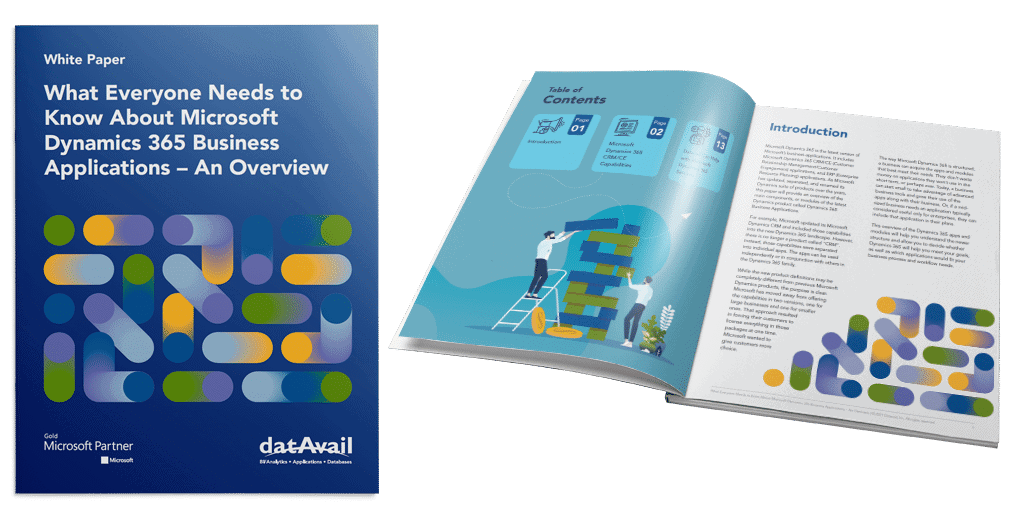What Everyone Needs to Know About Microsoft Dynamics 365 Business Apps – An Overview

Microsoft Dynamics 365 is the latest version of Microsoft’s business applications.
It includes Microsoft Dynamics 365 CE/CRM (Customer Engagement/Customer Relationship Management) applications, and ERP (Enterprise Resource Planning) applications.
As Microsoft has updated, separated, and renamed its Dynamics suite of products over the years, this paper will provide an overview of the main components, or modules of the latest Dynamics product called Dynamics 365 Business Applications.
For example, Microsoft updated its Microsoft Dynamics CRM and included those capabilities into the new Dynamics 365 landscape. However, there is no longer a product called “CRM”. Instead, those capabilities were separated into individual apps. The apps can be used independently or in conjunction with others in the Dynamics 365 family.
This overview of the Dynamics 365 apps and modules will help you understand the newer structure and allow you to decide whether Dynamics 365 will help you meet your goals.
In this white paper overview, we’ll address:
- Microsoft Dynamics 365 CE/CRM Capabilities – The CRM capabilities in Microsoft Dynamics 365 are divided into five main categories: Sales, Marketing, Customer Service, Field Service, and Project Operations (formerly Project Service Automation).
- Dynamics 365 Sales – Designed to let users manage the sales process in one all-encompassing dashboard. Users can identify target customers, move leads through the sales pipeline, manage relationships, generate reports, and more. Separate modular sales apps include:
- Dynamics 365 Sales Professional/Hub
- Relationship Sales
- Dynamics 365 Customer Service – Makes personalized customer service available in several ways. Agents use a centralized dashboard to see a 360-degree view of the customer and previous contacts, and can also provide omnichannel support to respond to customers, plus many other capabilities.
- Dynamics 365 Marketing – Develop marketing campaigns that are delivered across different channels, and personalize journeys based on customer interactions. Additional functionalities are also covered.
- Dynamics 365 Field Service – For a company that serves customers in the field, delivering excellent customer experiences can be a challenge. The Dynamics 365 Field Service app is designed to avoid those problems and add value to field service operations that will delight customers, and more.
- Dynamics 365 Project Service Automation (Now Project Operations) – Use to connect sales, project management, and finance teams. The app is designed to help users win more contracts, utilize resources most effectively, and streamline the process of completing project deliverables, etc.
- Dynamics 365 Retail (Now Commerce) – Manages activities across e-commerce, in-store, call center, back office, and emerging channels.
- Dynamics 365 Finance and Operations – Designed to increase the user’s visibility into financial operations to increase profitability.
- Dynamics 365 Talent (Now Human Resources) – Provides a variety of features, including centralizing employee profiles, offering employees self-service tools, integrations with talent systems such as LinkedIn, etc.
- Supporting Apps in Dynamics 365 – These applications can be use in conjunction with Dynamics 365 to create additional capabilities.
- Power Apps – Allows users to create low-code apps that improve processes. Prebuilt templates are available for users to customize, but the drag and drop user interface can be used by non-coding users. The apps users create can be integrated with Microsoft 365 (formerly Office 365) and Dynamics 365 to obtain business data stored in those applications.
- Power Automate (Previously Microsoft Flow) – Used to automate workflows to eliminate repetitive tasks. Users identify triggers that launch an automated workflow.
- Dynamics 365 Customer Insights – Helps users gather, assimilate, and make plans based on customer data that is presented in a clear and actionable format. Dashboards display AI-powered insights in real time. Users can see a 360-degree view of customers based on transactional, behavioral, and demographic data.
- Datavail Can Help with Microsoft Dynamics 365 Services – From consulting and development to fully managed services, Datavail offers the Dynamics 365 CRM support you need to take full advantage of all that the Microsoft Dynamics CRM capabilities provide.
- Overall, Microsoft Dynamics 365 offers a wide range of capabilities. There are a lot of moving parts just to develop and implement the CRM applications, covering Sales, Customer Service, Marketing, Field Service, and Project Operations.
- If you want to increase lead generation, improve your service levels, strengthen your competitive edge, and grow your business, the Dynamics 365 CRM applications can help you reach those goals. But there are challenges you need to address before you can take advantage of the power of Dynamics 365.
- Datavail can help you:
- Upgrade to the cloud from your on-premises installations
- Migrate on-premises and legacy systems to Microsoft’s cloud applications
- Establish collaboration and access across applications
- Increase adoption of new apps with end-user training and support
- Develop custom apps that you need to integrate with the Microsoft suite
- Improve the self-service capability you offer your customers
- Provide fully managed Dynamics 365 services and 24/7 support
- Improve the reliability of your existing systems to take on more mission-critical tasks
Download the White Paper